Directions (1-5): answer the questions based on the information given below.
There are eight persons A, B, C, D, E, F, G and H who live in a building having four floors such that the ground floor is numbered as 1 and the floor immediately above the ground floor is numbered as 2 and so on up to the top floor is numbered as 4.
Each of the floors consists of two types of flats i.e., flat-A and flat -B. Flat-A of floor 2 is immediately above the flat – A of floor 1 and immediately below flat – A of floor 3 and in the same way flat -B of floor 2 is immediately above the flat – B of floor 1 and immediately below the flat-B of floor 3 and so on. Also, flat -A is in the west of flat-B. Only one person lives in each flat. Each of the flats is of the same dimension.
G lives in flat-B. H lives to the west of F. H and A live in the same type of flat. A lives above H. C and B live on the same floor. B lives below the floor of D and both live in the same type of flat. E lives above G. E and G do not live in the same type of flat. There is one floor between G and F’s floor. E lives on an even-numbered floor.
Q1. Who among the following lives in Flat A of floor 3?
(a) D
(b) A
(c) G
(d) B
(e) None of these
Q2. Who lives immediately above G in same type of flat as G lives?
(a) B
(b) C
(c) A
(d) D
(e) None of these
Q3. Who among the following lives in Flat A of floor 2?
(a) D
(b) H
(c) C
(d) None of these
(e) E
Q4. Who lives exactly between G and F in the same type of flat?
(a) D
(b) A
(c) B
(d) Either E or D
(e) E
Q5. Which of the following statement is true?
(a) D lives below F in the same type of flat
(b) A lives above D
(c) E and H live on consecutive floors
(d) D lives west of E
(e) B and F live in same type of flat
Directions (6-10): Answer the questions based on the information given below.
Ten boxes M, N, O, P, Q, R, S, T, U, and V are kept above one another such that the bottommost box is 1 and the box above it is 2 and so on. Three boxes are kept between Box V and Box S. Box Q is kept just above Box U and both the boxes are kept above Box V. Four boxes are kept between Box Q and Box N. Three boxes are kept between Box T and Box R which is not kept above Box N. Three boxes are kept between Box M and Box O. At most 2 boxes are kept below O. The number of boxes kept below Box O is same as the number of boxes kept above Box V.
Q6. Which of the following statements is/are true?
(a) Two boxes are kept between box U and box T
(b) Box M is kept just above Box N
(c) Box R is bottommost box
(d) Box U is topmost box
(e) None of the above
Q7. Which box is kept just above box P?
(a) O
(b) R
(c) M
(d) S
(e) Either O or M
Q8. How many boxes are kept between Box M and Box P?
(a) One
(b) Two
(c) Three
(d) Four
(e) Five
Q9. Which of the following box is the bottommost box?
(a) R
(b) T
(c) P
(d) S
(e) None of these
Q10. Four of the following five are alike in a certain way and hence form a group. Which is the one that doesn’t belong to that group?
(a) Box Q and V
(b) Box V and T
(c) Box T and S
(d) Box S and R
(e) Box O and R
Directions (11-15): In each question below, some statements are given followed by some conclusions. You have to take the given statements to be true even if they seem to be at variance with commonly known facts. Read all the conclusions and then decide which of the given conclusions logically follows from the given statements, disregarding commonly known facts.
Q11. Statements: Only a few Date is Time.
All Month is Year.
No Time is Year.
Conclusions: I. No Month is Date.
II. Some Year is Date is a possibility.
(a) Only I follow
(b) Both I and II follow
(c) Only II follows
(d) None follows
(e) None of these
Q12. Statements: Only Purple is Yellow.
Some Purple is Green.
No Blue is Purple.
Conclusions: I. All Blue is Green is a possibility
II. All Green is Yellow is a possibility
(a) Only I follow
(b) Both I and II follow
(c) Only II follows
(d) Either I or II follows
(e) None follows
Q13. Statements: All Spring is Happy.
No Happy is Joy.
No Joy is March.
Conclusions: I. Some March is Spring
II. No Spring is March
(a) Only II follows
(b) Both I and II follow
(c) Only I follow
(d) Either I or II follows
(e) None follows
Q14. Statements: Only a few Job is Salary.
No Party is Night.
All Salary is Party.
Conclusions: I. All Night is Job is a possibility
II. All Job is Party is a possibility
(a) Only I follow
(b) Both I and II follow
(c) Either I or II follow
(d) Only II follows
(e) None of these
Q15. Statements: No Profit is Loss.
Some Sale is Loss.
Only a few Loss is Price.
Conclusions: I. Some Sale is not Profit
II. No Profit is Price.
(a) Only I follow
(b) Both I and II follow
(c) Only II follow
(d) Either I or II follows
(e) None of these
Solutions
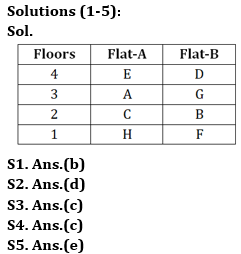
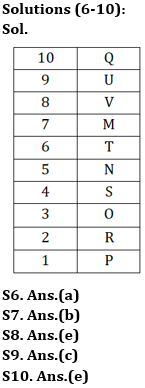
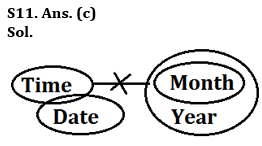
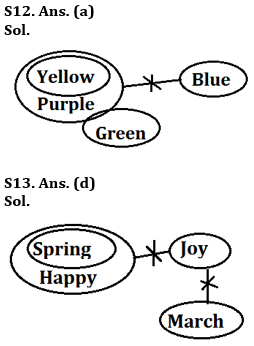
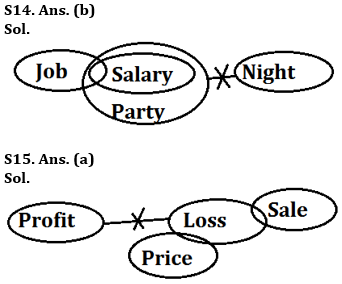
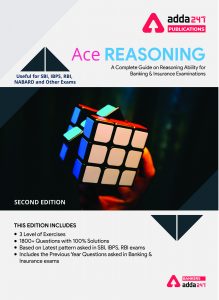




 GA Capsule for SBI Clerk Mains 2025, Dow...
GA Capsule for SBI Clerk Mains 2025, Dow...
 The Hindu Review October 2022: Download ...
The Hindu Review October 2022: Download ...
 World Malaria Day 2025
World Malaria Day 2025




